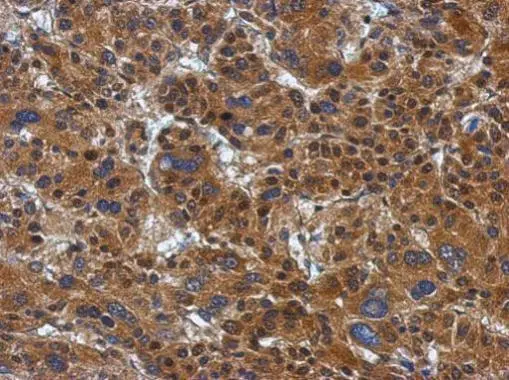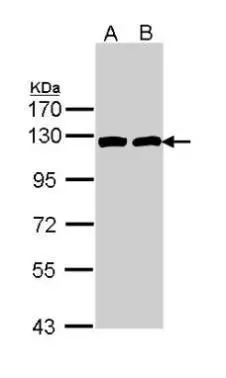
Immunohistochemical analysis of paraffin-embedded Hepatoma, using ATP citrate lyase(GTX112387) antibody at 1:500 dilution.
Antigen Retrieval: Trilogy? (EDTA based, pH 8.0) buffer, 15min
ATP citrate lyase antibody [N1N2], N-term
GTX112387
ApplicationsImmunoFluorescence, Western Blot, ImmunoCytoChemistry, ImmunoHistoChemistry, ImmunoHistoChemistry Paraffin
Product group Antibodies
ReactivityHuman, Mouse, Rat
TargetACLY
Overview
- SupplierGeneTex
- Product NameATP citrate lyase antibody [N1N2], N-term
- Delivery Days Customer9
- Application Supplier NoteWB: 1:1000-1:10000. ICC/IF: 1:100-1:1000. IHC-P: 1:100-1:1000. *Optimal dilutions/concentrations should be determined by the researcher.Not tested in other applications.
- ApplicationsImmunoFluorescence, Western Blot, ImmunoCytoChemistry, ImmunoHistoChemistry, ImmunoHistoChemistry Paraffin
- CertificationResearch Use Only
- ClonalityPolyclonal
- Concentration0.93 mg/ml
- ConjugateUnconjugated
- Gene ID47
- Target nameACLY
- Target descriptionATP citrate lyase
- Target synonymsACL, ATPCL, CLATP, ATP-citrate synthase, ATP-citrate (pro-S-)-lyase, citrate cleavage enzyme
- HostRabbit
- IsotypeIgG
- Protein IDP53396
- Protein NameATP-citrate synthase
- Scientific DescriptionATP citrate lyase is the primary enzyme responsible for the synthesis of cytosolic acetyl-CoA in many tissues. The enzyme is a tetramer (relative molecular weight approximately 440,000) of apparently identical subunits. It catalyzes the formation of acetyl-CoA and oxaloacetate from citrate and CoA with a concomitant hydrolysis of ATP to ADP and phosphate. The product, acetyl-CoA, serves several important biosynthetic pathways, including lipogenesis and cholesterogenesis. In nervous tissue, ATP citrate-lyase may be involved in the biosynthesis of acetylcholine. Two transcript variants encoding distinct isoforms have been identified for this gene. [provided by RefSeq]
- ReactivityHuman, Mouse, Rat
- Storage Instruction-20°C or -80°C,2°C to 8°C
- UNSPSC12352203
References
- García-Arroyo FE, Monroy-Sánchez F, Muñoz-Jiménez I, et al. Allopurinol Prevents the Lipogenic Response Induced by an Acute Oral Fructose Challenge in Short-Term Fructose Fed Rats. Biomolecules. 2019,9(10). doi: 10.3390/biom9100601Read this paper
- Li X, Yu W, Qian X, et al. Nucleus-Translocated ACSS2 Promotes Gene Transcription for Lysosomal Biogenesis and Autophagy. Mol Cell. 2017,66(5):684-697.e9. doi: 10.1016/j.molcel.2017.04.026Read this paper

![ATP citrate lyase antibody [N1N2], N-term detects ATP citrate lyase protein at cytoplasm by immunohistochemical analysis. Sample: Paraffin-embedded mouse pancreas. ATP citrate lyase stained by ATP citrate lyase antibody [N1N2], N-term (GTX112387) diluted at 1:500. Antigen Retrieval: Citrate buffer, pH 6.0, 15 min ATP citrate lyase antibody [N1N2], N-term detects ATP citrate lyase protein at cytoplasm by immunohistochemical analysis. Sample: Paraffin-embedded mouse pancreas. ATP citrate lyase stained by ATP citrate lyase antibody [N1N2], N-term (GTX112387) diluted at 1:500. Antigen Retrieval: Citrate buffer, pH 6.0, 15 min](https://www.genetex.com/upload/website/prouct_img/normal/GTX112387/GTX112387_44000_20210625_IHC-P_M_w_23060500_241.webp)
![ATP citrate lyase antibody [N1N2], N-term detects ATP citrate lyase protein at cytoplasm by immunofluorescent analysis. Sample: HeLa cells were fixed in ice-cold MeOH for 5 min. Green: ATP citrate lyase protein stained by ATP citrate lyase antibody [N1N2], N-term (GTX112387) diluted at 1:500. Blue: Hoechst 33342 staining. ATP citrate lyase antibody [N1N2], N-term detects ATP citrate lyase protein at cytoplasm by immunofluorescent analysis. Sample: HeLa cells were fixed in ice-cold MeOH for 5 min. Green: ATP citrate lyase protein stained by ATP citrate lyase antibody [N1N2], N-term (GTX112387) diluted at 1:500. Blue: Hoechst 33342 staining.](https://www.genetex.com/upload/website/prouct_img/normal/GTX112387/GTX112387_40667_20171012_IFA_w_23060500_779.webp)
![Various tissue extracts (50 μg) were separated by 5% SDS-PAGE, and the membrane was blotted with ATP citrate lyase antibody [N1N2], N-term (GTX112387) diluted at 1:5000. The HRP-conjugated anti-rabbit IgG antibody (GTX213110-01) was used to detect the primary antibody. Various tissue extracts (50 μg) were separated by 5% SDS-PAGE, and the membrane was blotted with ATP citrate lyase antibody [N1N2], N-term (GTX112387) diluted at 1:5000. The HRP-conjugated anti-rabbit IgG antibody (GTX213110-01) was used to detect the primary antibody.](https://www.genetex.com/upload/website/prouct_img/normal/GTX112387/GTX112387_40667_20180330_WB_M_R_w_23060500_849.webp)
![Various whole cell extracts (30 μg) were separated by 5% SDS-PAGE, and the membrane was blotted with ATP citrate lyase antibody [N1N2], N-term (GTX112387) diluted at 1:5000. The HRP-conjugated anti-rabbit IgG antibody (GTX213110-01) was used to detect the primary antibody. Corresponding RNA expression data for the same cell lines are based on Human Protein Atlas program. Various whole cell extracts (30 μg) were separated by 5% SDS-PAGE, and the membrane was blotted with ATP citrate lyase antibody [N1N2], N-term (GTX112387) diluted at 1:5000. The HRP-conjugated anti-rabbit IgG antibody (GTX213110-01) was used to detect the primary antibody. Corresponding RNA expression data for the same cell lines are based on Human Protein Atlas program.](https://www.genetex.com/upload/website/prouct_img/normal/GTX112387/GTX112387_45105_20230714_WB_TPM_watermark_24072519_808.webp)






![WB analysis of HeLa (1), NIH3T3 (2), C6 (3), COS7 (4), and Raji (5) cell lysate using GTX60666 ATP citrate lyase antibody [5F8D11].](https://www.genetex.com/upload/website/prouct_img/normal/GTX60666/GTX60666_20170912_WB_w_23061123_543.webp)